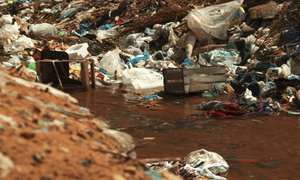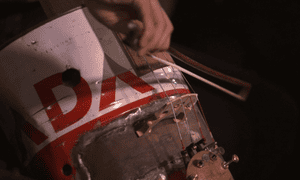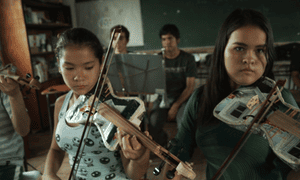
Post: The junk orchestra: making music out of a landfill

The junk orchestra: making music out of a landfill
“Music is the love of my life. Music has taught me so many things. It taught me to be a more disciplined person.” At 18 years old, Maria de Jesus Rios has already outlived the dreams of all but the biggest rock‘n’rollers. She has played alongside Metallica and Megadeth and in the great music halls of Europe, and she has done it all on a violin made out of rubbish.
A member of Paraguay’s Recycled Orchestra, Rios is confident and well-travelled. But before learning to play, she recalls the invisibility of a childhood spent amid the filth of Cateura, Asunción’s largest rubbish dump.
“The people didn’t pay attention to the children before. Now they want to talk with us, they approach us.”
In Cateura, just outside the Paraguayan capital, 40,000 people live in a desperately poor neighbourhood. Music resonates throughout the community from cheap plastic radios, yet for most residents a musical instrument is an unattainable treasure.

In 2006, Favio Chávez, an environmental consultant, and Nicolás “Cola” Gómez, a rubbish picker, began to wonder if they could create instruments from scraps they found on the tip face.
“People in Cateura use trash as a resource,” says Chávez. “It was a natural approach in Cateura to look for an answer and resolve the need for instruments using recyclable materials.”
Their workshop became a place of musical refinement and experimentation. An oil drum was a good body for a cello; a bent kitchen fork for a violin tailpiece. The first few scratchy instruments were given to local kids for whom a new violin might cost a month of their parents’ wages. Chávez began to train his ensemble.
“This is not a place where someone can have a violin. A violin is worth more than a house here. A violin made out of trash is worth nothing, so it will not be sold or stolen,” he says.
“It is very challenging to play a recycled violin, the weather changes the sound. When it is hot, it’s hard to hear. But my violin is my friend,” Rios adds.
From their first cacophonous practice, the orchestra slowly got the hang of their idiosyncratic instruments. A short YouTube clip made to secure crowdfunding for a documentary on the children spawned hundreds of media stories from countries across the world and launched them to global fame.
Now they are seasoned performers, including doing a show with heavy metal group Megadeth (who admit to being fans) and a South American tour with Metallica. But Chávez told The Guardian that the idea did not depend on things so arbitrary as fame or success. Musical instruments occupy a near mythical realm of precision and refinement in our culture. But the children of Cateura showed that an orchestra is formed by people, not instruments.
“The idea is now available for anyone. This is something that could be replicated in any part of the world where they have similar circumstances. It can be an inspiration for music to be part of the community where there are not the resources.”

Landfill Harmonic, a film that follows their journey, won a special mention in the environment award at the prestigious Sheffield Doc/Fest last month. The judges said the story showed “the power of music to raise its protagonists above and beyond their physical circumstances”.
Rios wants to become a professional violin teacher; she currently has 17 students from the neighbourhood. She says the experience of going to Rio de Janeiro for their first international gig, where they played to luminaires at the UN Earth Summit, was her greatest memory. But the concert itself was a sideshow to the first time they saw the ocean.
“I never imagined I would be at the beach. And then being there with my friends was special,” she says.

The film itself has played a role in stretching the reality beyond even the wildest dreams of its subjects. Using crowdfunding and production budgets, the children have been able to travel the world. But Chávez, who has only just started receiving a wage after thousands of volunteered hours with the orchestra, insists that the key elements, the music and the benefits to community, cost little apart from the time to make instruments and engage with children.
“In our case, of course a lot of elements coincided at one point. We know that the initiative is valid for other places. I don’t think they will play with Metallica, but what matters is that this can be set as an alternative. I think we proved that it is possible to do it.”
The orchestra has now spawned copycats and is connected with similar groups who have formed independently from around the world. Chávez says he has heard from communities from Ecuador, Panama, Brazil and Burundi that had begun similar schemes.
In Mexico, the Orquestra Basura (Trash Orchestra) have recorded albums and achieved minor celebrity status. In Spain, recycling company Ecoembes funded the creation of its own orchestra after a visit from the orchestra from Paraguay. The group, comprised of children from dysfunctional families in Madrid, recently played for Spain’s Queen Sofia.
“When we met [the Cateura orchestra], we felt absolutely identified with this project,” says a spokesperson for the company. “It is really magical to realise that where some people see rubbish, others see music.”
Source: The Guardian










